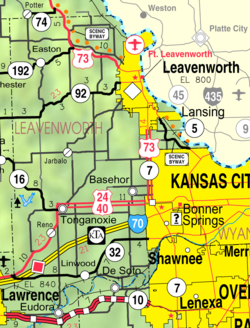Lansing, Kansas
| Lansing, Kansas | ||
|---|---|---|
| City | ||

Lansing High School band marching in the 2015 Veterans Day Parade
|
||
|
||
 Location within Leavenworth County and Kansas |
||
 KDOT map of Leavenworth County (legend) |
||
| Coordinates: 39°14′55″N 94°53′31″W / 39.24861°N 94.89194°WCoordinates: 39°14′55″N 94°53′31″W / 39.24861°N 94.89194°W | ||
| Country | United States | |
| State | Kansas | |
| County | Leavenworth | |
| Incorporated | 1959 | |
| Government | ||
| • Mayor | Gene Kirby | |
| • City Administrator | Tim Vandall | |
| • City Clerk | Sarah Bodensteiner | |
| Area | ||
| • Total | 12.50 sq mi (32.37 km2) | |
| • Land | 12.39 sq mi (32.09 km2) | |
| • Water | 0.11 sq mi (0.28 km2) 0.88% | |
| Elevation | 846 ft (258 m) | |
| Population (2010) | ||
| • Total | 11,265 | |
| • Estimate (2012) | 11,591 | |
| • Density | 900/sq mi (350/km2) | |
| Time zone | CST (UTC-6) | |
| • Summer (DST) | CDT (UTC-5) | |
| ZIP code | 66043 | |
| Area code | 913 | |
| FIPS code | 20-38650 | |
| GNIS feature ID | 0478431 | |
| Website | Lansing.KS.us | |
Lansing is a city situated along the Missouri River in the eastern part of Leavenworth County, located in northeast Kansas, in the Central United States. As of the 2010 census, the city population was 11,265. It is the second most populous city of Leavenworth County and is a part of the Kansas City metropolitan area.
The Lansing Correctional Facility (formerly the Kansas State Penitentiary), which includes the state's main maximum-security prison, is located in Lansing.
Lansing is named for James Lansing, a pioneer settler. Formerly William Lansing Taylor, James changed his name upon his enlistment in 1862 as a hospital steward in the 7th Kansas Cavalry. Following the Civil War, he earned a position at the new state penitentiary in Kansas as a hospital steward. He later resigned and opened a general mercantile store, which held the post office and an apothecary business, in the area called “Town of Progress”. “Doc Lansing”, as he became known, and his friend John C. Schmidt became co-owners of 90 acres (360,000 m2) of land that was platted into town lots in 1878; they named the area “Town of Lansing”. Lansing did not become an incorporated city until 1959.
The Kansas State Penitentiary, later renamed the Lansing Correctional Facility in 1990, was authorized by the Kansas Constitution in 1859; it is the state's largest and oldest facility for detention and rehabilitation of male adult felons. With the opening of the coal mine at the prison the town became an important shipping point for this product.
...
Wikipedia

